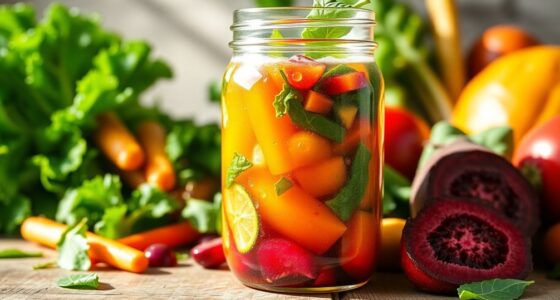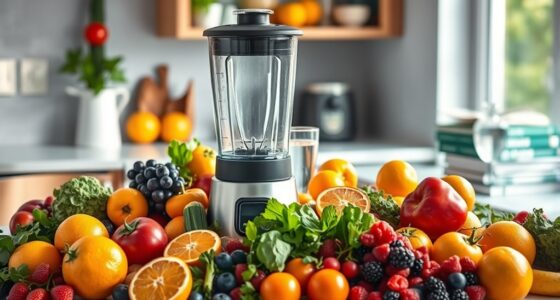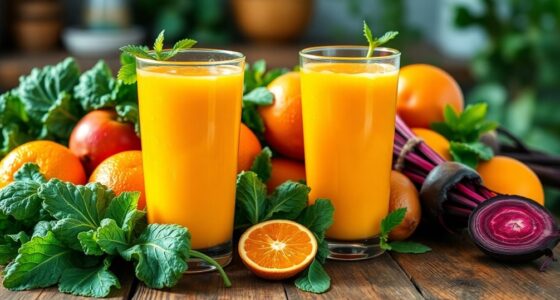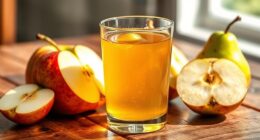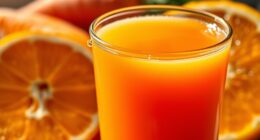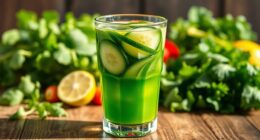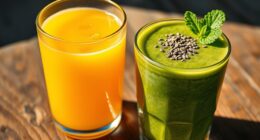A juice cleanse is a short-term plan where you replace meals with fruit and vegetable juices to support your body’s natural detox processes and encourage healthier eating habits. It’s not a magic detox or quick weight-loss solution; your liver and kidneys already handle detoxing. While it can boost energy and provide nutrients, it’s best used alongside a balanced lifestyle. To discover more about what to expect and how to do it safely, keep exploring these basics.
Key Takeaways
- A juice cleanse involves consuming nutrient-rich fruit and vegetable juices to support overall health and give the digestive system a break.
- It is not a quick fix for detoxing, weight loss, or removing toxins; the liver and kidneys handle detoxification naturally.
- Juice cleanses should use fresh, whole ingredients and avoid added sugars or preservatives found in commercial juices.
- They are best as a short-term supplement to a balanced diet, not a long-term solution or replacement for healthy eating.
- Properly done, juice cleanses can promote vitality and renewed health but do not perform miracles or replace medical advice.

A juice cleanse is a popular way to boost your health by giving your digestive system a break and flooding your body with nutrients. But before you immerse yourself, it’s important to understand what it truly involves and dispel some common detox myths. Many people believe that a juice cleanse can magically detox your body, but that’s not entirely accurate. Your liver and kidneys already do a great job of detoxifying, and a cleanse isn’t a magic bullet. Instead, it’s more about giving your body a break from processed foods and heavy meals, while providing nutrients to support your energy and well-being.
When considering a juice cleanse, you’ll likely encounter a variety of juice ingredients. These typically include fruits like apples, oranges, and berries, which add natural sweetness and antioxidants. Vegetables such as cucumbers, spinach, kale, and celery are common for their vitamins, minerals, and fiber. Some cleanses incorporate herbs like mint or ginger to add flavor and potential health benefits. The idea is to blend or juice these ingredients into nutrient-dense drinks that are easy to digest and hydrating. However, it’s essential to remember that not all juice ingredients are created equal, and some commercial juices may contain added sugars or preservatives, which can negate some health benefits. Opting for fresh, whole ingredients and making your own juices ensures you’re getting the most nutrients without unnecessary additives.
Many detox myths circulate about juice cleanses, such as the misconception that they can cause rapid weight loss or eliminate toxins instantly. While you might see some initial weight loss due to reduced calorie intake, it’s often water weight and not fat. More importantly, juice cleanses are not a long-term solution for detoxing or weight management. They can serve as a reset to your eating habits but shouldn’t replace a balanced diet. Also, some people wrongly assume that they can consume unlimited juice without consequences, but excessive intake of fruit juices can lead to high sugar consumption, which may cause blood sugar spikes. It’s helpful to look for Room‑size wattage guides and other resources to better understand how to incorporate such cleanses into a balanced lifestyle.
A true understanding of a juice cleanse recognizes that it’s best used as a short-term supplement to a healthy lifestyle rather than a cure-all. Incorporate a variety of juice ingredients to maximize nutrient intake while staying mindful of your body’s signals. Remember, your body is equipped with its own detox system, and a cleanse is more about supporting your overall health than performing miracles. When done thoughtfully and with proper knowledge, a juice cleanse can be a revitalizing way to promote better habits and a renewed sense of vitality.
Frequently Asked Questions
Can I Exercise During a Juice Cleanse?
You can exercise during a juice cleanse, but focus on exercise safety by choosing light activities like walking or gentle yoga. Listen to your body and avoid intense workouts, as your nutritional balance might be temporarily compromised. Staying hydrated and resting when needed helps prevent fatigue. Always prioritize your wellbeing, and if you feel weak or dizzy, stop exercising and give your body time to adapt.
How Long Should a Typical Juice Cleanse Last?
A typical juice cleanse should last about 1 to 3 days for most people. The ideal length depends on your health goals and how your body responds. If you’re new, start with a shorter duration to see how you feel. Remember, longer cleanses might lead to nutrient deficiencies or fatigue. Listen to your body, and consider consulting a healthcare professional for personalized advice.
Are There Any Risks for Certain Health Conditions?
You might worry about risks if you have certain health conditions, but avoiding a juice cleanse without medical advice isn’t wise. For health condition considerations, it’s essential to consult a healthcare professional first. Some conditions, like diabetes or kidney issues, can be affected by sudden dietary changes. Always prioritize medical consultation significance before starting a juice cleanse to guarantee safety and avoid complications.
What Should I Do After Completing a Cleanse?
After completing your juice cleanse, you should focus on post-cleanse hydration by drinking plenty of water and herbal teas. Gradually reintroduce solid foods, starting with light, easily digestible options like fruits and vegetables. This helps your digestive system adjust smoothly. Listen to your body, and avoid rushing back into heavy or processed foods. Taking these steps supports your detox and promotes lasting health benefits.
Is a Juice Cleanse Suitable for Children or Pregnant Women?
Did you know that only 2% of children worldwide meet daily fruit and vegetable intake recommendations? Juice cleanses aren’t suitable for children or pregnant women, as children safety and pregnancy concerns demand balanced nutrition. Restrictive diets can lead to nutrient deficiencies, affecting growth and fetal development. It’s best to focus on whole foods and consult healthcare providers before making dietary changes during pregnancy or for children’s health.
Conclusion
Now that you understand what a juice cleanse is—and isn’t—you’re better equipped to decide if it’s right for you. Remember, research shows only about 2% of people stick with juice cleanses long-term, highlighting how challenging they can be. Whether you choose to try one or not, prioritize balanced eating and listening to your body. Ultimately, sustainable habits matter more than quick fixes for your health and well-being.
Cindy thoroughly researches juicing trends, techniques, and recipes to provide readers with practical advice and inspiration. Her writing style is accessible, engaging, and designed to make complex concepts easy to understand. Cindy’s dedication to promoting the advantages of juicing shines through her work, empowering readers to make positive changes in their lives through the simple act of juicing.





